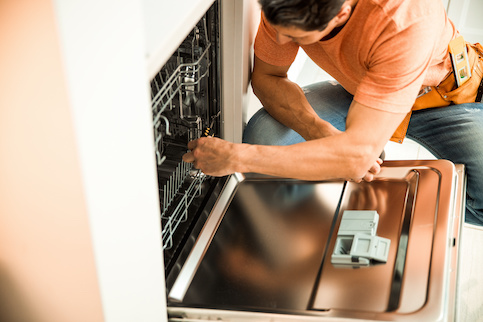When you buy a home, you buy any problems that come with it. It can be a shock for new homeowners when an appliance breaks down or your heat stops working – and you have to pay for repairs. A home warranty policy can soften the financial blow a bit. Here’s what you need to know about how home warranties work and how much they cost.
Key Takeaways:
- A home warranty is a service contract for the repair or replacement of specific appliances and systems in your home.
- Though the cost can vary based on several factors, a basic home warranty typically ranges from $350 to $600 per year.
- You’ll have to pay a service fee to use your home warranty, and there may be limits on how much is covered.
What Is A Home Warranty?
A home warranty plan covers the cost of repairing or replacing major appliances and specific systems in your home.
There are three common types of home warranties:
- System plans. A system plan covers your home’s electrical, plumbing, heating, ventilation and air conditioning systems.
- Appliance plans. This plan covers major appliances, such as your oven, stove, refrigerator, washer, dryer, water heater or built-in microwave oven.
- Combination plans. A combination plan covers both appliances and systems.
A home warranty typically needs to be renewed each year, though the specifics of the contract can vary.
When shopping for a home warranty, you can add coverage for additional systems such as a well pump or swimming pool equipment.
What’s Your Goal?
Buy A Home
Discover mortgage options that fit your unique financial needs.

Refinance
Refinance your mortgage to have more money for what matters.
Tap Into Equity
Use your home’s equity and unlock cash to achieve your goals.
7 Things Commonly Covered By The Home Warranties
What’s covered by your home warranty depends on your provider and the plan you choose. The following items typically are covered by a home warranty, though many providers will allow you to add more coverage for an additional fee. Always check the details of the specific coverage to make sure you’re covered.
1. Refrigerators
If your fridge is making noise and food is going bad too quickly, it can be a sign that you need to replace it. The average cost for a new refrigerator can range from $600 to $2,300.
2. Washers And Dryers
Most washer and dryer systems have a life span of just over a decade. New washers can cost between $475 to $2,200, while new dryers may range from $400 to $2,300.
3. Dishwashers
If your dishwasher breaks and you don’t have a warranty, a new basic dishwasher could cost between $400 and $800.
4. Ovens
The average life span of an oven is about 15 years.
5. HVAC Systems
According to Angie’s List, the average cost to repair an HVAC system runs from $130 to $2,000, depending on the repair needed. The average replacement cost for an HVAC system is $7,500.
6. Plumbing And Water Heaters
If your plumbing has a leak or clog, it can range from $180 to almost $500 to fix. More major issues like a burst pipe can cost thousands of dollars. Water heater installation can range from $800 to $2,000.
7. Garage Doors
Garage replacement can range from $754 to $1,696 on average.
Ready To Become A Homeowner?
Get matched with a lender that can help you find the right mortgage.
How Much Are Home Warranty Rates?
Home warranties usually charge a monthly fee and a service fee. A basic home warranty typically costs $350 to $600 per year. If you want to add coverage to include more systems and appliances, that can add $100 to $500. The service fee is charged when you use the coverage, typically costing $75 to $125.
As you adjust to paying a mortgage, homeowners insurance, property taxes and other expenses, you might be reluctant to add a home warranty. However, knowing you won’t be on the hook for a brand-new appliance if something breaks may give you peace of mind.
Factors Affecting Home Warranty Rates
The cost of your monthly fee can depend on several factors, including:
- Home type
- Home age
- Extent of coverage
- Add-on coverage
- Square footage
- Location
Home Warranty Coverage Limits
A typical home warranty covers some appliances and systems – but not all. It’s important to know your coverage limits and if there are any exclusions.
It’s important to note that home warranties often limit their coverage. Say your home warranty covers up to $1,000 per appliance. Your refrigerator breaks, and a comparable new model costs $1,200. You’d have to pay the difference out of pocket, though it’s considerably less than paying full price.
A home warranty also doesn’t cover renovations or home improvements. It’s also not a substitute for homeowners insurance.
Home warranties usually won’t cover repairs to the structure of your home, including walls, floors, windows and your home’s exterior.
How Much Can A Home Warranty Save You On Repair
A home warranty can save you anywhere from a few hundred to several thousand dollars, depending on the appliance or system. Another variable is whether the appliance or system can be repaired or needs to be replaced.
It may be helpful to list your appliances and the repairs you anticipate having to make and compare that with the home warranty cost. Don’t forget to account for the service fees you’ll be charged for using the warranty.
Take The First Step To Buying A Home
Find a lender that will work with your unique financial situation.
Is A Home Warranty Worth It?
A home warranty comes with plenty of advantages, but is a home warranty worth it? First and foremost, paying for a coverage plan gives you invaluable peace of mind, knowing that your budget won’t be on the hook when a home system or appliance breaks.
Although you have to pay upfront, the overall cost of a home warranty is likely less than paying for covered services out of pocket.
Home Warranty Pros And Cons
Let’s look at some of the advantages and drawbacks of home warranties.
Home Warranty Pros And Cons
| Pros | Cons |
|---|---|
| You don’t have to cover the cost of repairing or replacing certain home appliances and systems. | An additional monthly or annual cost. |
| Potential substantial savings. | Not everything is covered. |
| You can allocate money to other things, knowing you have coverage if something breaks. | Dollar limits on certain repairs. |
| Peace of mind. | Service fees. |
| Added protection if your home appliances are starting to show wear out. | You may have to wait longer for repairs working with your warranty company. |
When To Skip A Home Warranty
If you can comfortably afford to repair or replace your appliances and systems, you may be able to forgo the warranty. You also may skip the warranty if your home is new or you don’t feel comfortable letting the home warranty company choose your repair technician.
3 Ways To Save Money On A Home Warranty
Here are some tips on saving money on a home warranty.
1. Pay For Only The Coverage You Need
If you want to limit the cost of your warranty, just stick with the basic coverage. If your home is newer, you may not need any add-ons.
2. Ask For Discounts
Some warranty companies offer discounts to new customers or home buyers in new developments. You also may get a lower introductory rate for the first year.
3. Shop Around
Each home warranty company sets its own rates. Get quotes from a few providers to make sure you get the best deal.
FAQ
Here are answers to common questions about home warranties.
The Bottom Line
A home warranty is a way to protect your budget against unexpected expensive home repairs. Although not every item in your home will be covered, knowing that your major home systems and appliances are protected can offer peace of mind.
More From Quicken Loans:
- Are Home Warranty Plans Worth The Money?
- Home Warranty Vs. Home Insurance: Everything You Need To Know
- Warranty Deed: What Is It, And Should You Get One?
- Special Warranty Deed: What It Is And Do You Need One?
- Home Warranty Facts And The Best Companies
- Hazard Insurance: A Complete Guide For Homeowners
Sarah Sharkey contributed to the reporting of this article.

Rory Arnold
Rory Arnold is a Los Angeles-based writer who has contributed to a variety of publications, including Quicken Loans, LowerMyBills, Ranker, Earth.com and JerseyDigs. He has also been quoted in The Atlantic. Rory received his Bachelor of Science in Media, Culture and Communication from New York University. He also completed the SoFi/Coursera Fundamentals of Personal Finance Specialization consisting of five courses: Introduction to Personal Finance, Saving Money for the Future, Managing Debt, Fundamentals of Investing, and Risk Management in Personal Finance.












